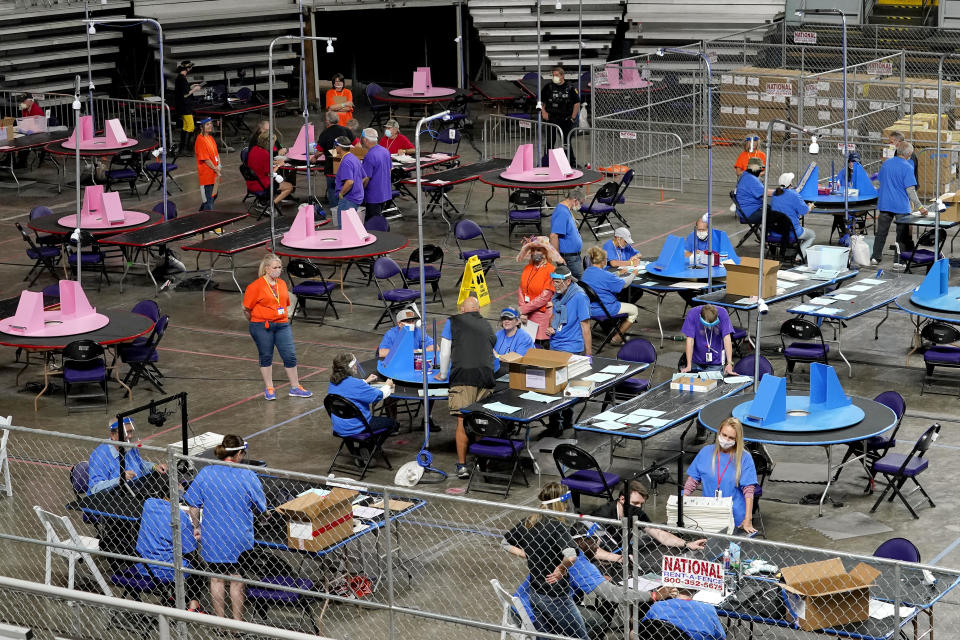Arizona Senators who cheered 2020 election review advance voting-related legislation
Banning cities or school boards from conducting all-mail elections. Changing the threshold for automatic recounts. Proposing changes to the way Arizona handles residents who only vote in federal elections.
These are some of the measures included in a slew of election-related bills that were advanced by the Arizona state Senate on Monday. Some of the bills were sponsored by lawmakers who cheered a Senate Republican-ordered review of the 2020 election in the state's largest county.
The seven bills that passed out of committee also included requiring counties to use special paper with anti-fraud markings on ballots, and mandating that ballot images be posted online.
The bills all passed the GOP-controlled committee along party lines.

The hearing came several months after Senate Republicans' review of the 2020 election in Maricopa County concurred that President Biden won the county, but raised several concerns about election administration.
Maricopa County officials denied the Senate's contractors' claims of counting invalid ballots and election administration errors, saying the review was plagued by "faulty analysis, inaccurate claims, misleading conclusions, and a lack of understanding of federal and state election laws."
The hearing Monday featured testimony from speakers who spread previously debunked theories about the 2020 election, including the long-discredited theory that voters who used sharpies did not have their ballots counted. Several lawsuits alleging fraud in the 2020 election in Arizona were also unsuccessful.
"Saying that the election was stolen, I mean that's great for a campaign speech, but it's not reality," Democratic state Senator Martin Quezada said. "Our job as members is to focus on reality right here. The reality is this is solving a problem that does not exist."
Among those who addressed the committee was Kari Lake, who introduced herself as the "Trump-endorsed candidate for governor." Lake, a former television news anchor, has said that she wouldn't have certified the 2020 election and has promoted unfounded theories about the election.
"I'm talking to people every day around this state," Lake said. "They're so concerned about the elections. This last election was shady. It was shoddy. It was corrupt. And our vote was taken from us."
Republican state Senator Sonny Borrelli sponsored the bill that would require any ballots designed to prevent fraudulent ballots to adopt 19 specific anti-fraud aspects in ballots, including a watermark, "secure holographic foil" and "custom complex security background designs."
Critics raised concerns about the costs and implementation, but Borrelli said expects that the state would pick those up. He said it would cost about 25 cents per ballot.
"Any illegal ballot that gets injected into the system suppresses a legal vote," Borrelli said.
Examining paper ballots was a target of the Maricopa County review. Officials said they were looking for watermarks on ballots, a feature that didn't exist, and bamboo fibers in paper - and a report claimed there were 10 different types of paper used. Maricopa County asserted in its rebuttal that one type of paper was used "for every ballot" and "all paper was of sufficient thickness to prevent the printing from being discernible on the opposite side."
Two of the proposed bills deal with Arizona voters who can only cast ballots in federal elections. State law requires Arizonans to show proof of citizenship, but because that requirement doesn't exist in federal law, those who cannot provide that proof are still able to vote in federal elections.
One of the bills requires the Arizona Secretary of State to ask the U.S. Election Assistance Commission to include the state's proof of citizenship requirement on federal voter registration forms. The other requires the Secretary of State to provide access to the statewide voter registration database to a designee from the legislature and Attorney General's office to ensure that only eligible voters are registered. Election officials cross-check records to ensure voters are eligible.
The bill proposed related to recounts would lower the threshold for automatic recounts. Currently, an automatic recount is triggered by a race decided by 0.1%, but this proposal would expand the threshold to 0.5%.
The bills have to clear another Arizona Senate committee before they will head to the full Senate for approval.
Man who needs heart transplant refuses to get COVID-19 vaccine
Pfizer targets Omicron variant with new vaccine trial
Dow bounces back Tuesday while other indexes end the day low

